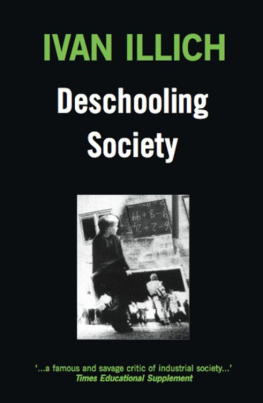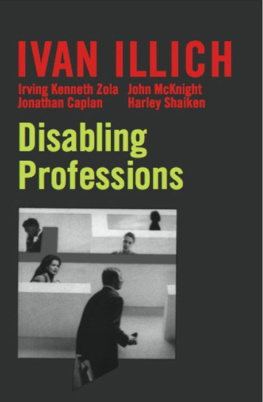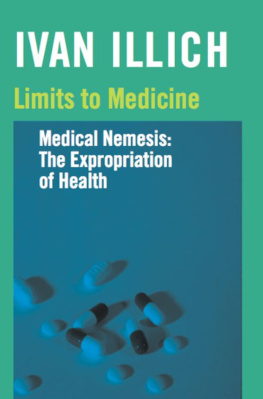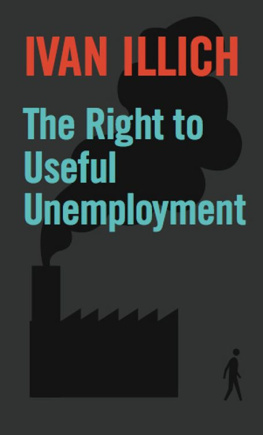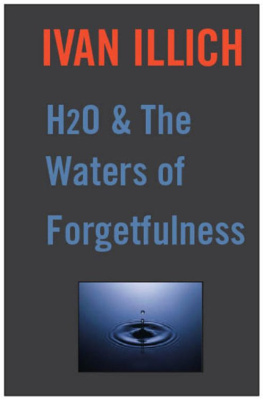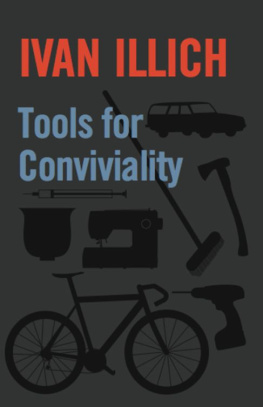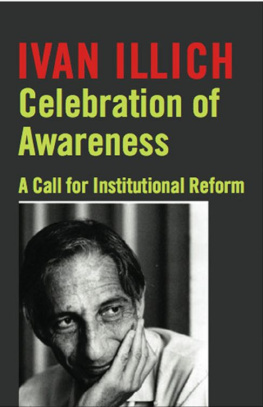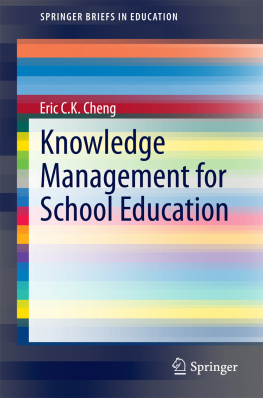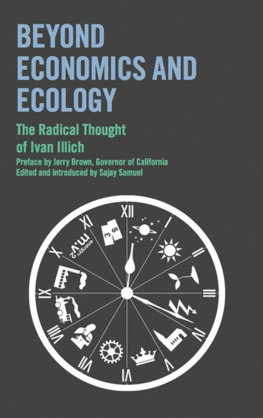I owe my interest in public education to Everett Reimer. Until we first met in Puerto Rico in 1958, I had never questioned the value of extending obligatory schooling to all people. Together we have come to realize that for most men the right to learn is curtailed by the obligation to attend school. The essays given at CIDOC and gathered in this book grew out of memoranda which I submitted to him, and which we discussed during 1970, the thirteenth year of our dialogue. The last chapter contains my afterthoughts on a conversation with Erich Fromm on Bachofens Mutterrecht.
Since 1967 Reimer and I have met regularly at the Center for Intercultural Documentation (CIDOC) in Cuernavaca, Mexico. Valentine Borremans, the director of the Center, also joined our dialogue, and constantly urged me to test our thinking against the realities of Latin America and Africa. This book reflects her conviction that the ethos, not just the institutions, of society ought to be deschooled.
Universal education through schooling is not feasible. It would be no more feasible if it were attempted by means of alternative institutions built on the style of present schools. Neither new attitudes of teachers toward their pupils nor the proliferation of educational hardware or software (in classroom or bedroom), nor finally the attempt to expand the pedagogues responsibility until it engulfs his pupils lifetimes will deliver universal education . The current search for new educational funnels must be reversed into the search for their institutional inverse: educational webs which heighten the opportunity for each one to transform each moment of his living into one of learning, sharing, and caring. We hope to contribute concepts needed by those who conduct such counterfoil research on educationand also to those who seek alternatives to other established service industries.
On Wednesday mornings, during the spring and summer of 1970, I submitted the various parts of this book to the participants in our CIDOC programs in Cuernavaca. Dozens of them made suggestions or provided criticisms. Many will recognize their ideas in these pages, especially Paulo Freire, Peter Berger, and Jos Mara Bulnes, as well as Joseph Fitzpatrick, John Holt, Angel Quintero, Layman Allen, Fred Goodman, Gerhard Ladner, Didier Piveteau, Joel Spring, Augusto Salazar Bondy, and Dennis Sullivan. Among my critics, Paul Goodman most radically obliged me to revise my thinking. Robert Silvers provided me with brilliant editorial assistance on Chapters 1, 3, and 6, which have appeared in TheNewYorkReviewofBooks.
Reimer and I have decided to publish separate views of our joint research. He is working on a comprehensive and documented exposition, which will be subjected to several months of further critical appraisal and be published late in 1971 by Doubleday & Company. Dennis Sullivan, who acted as secretary at the meetings between Reimer and myself, is preparing a book for publication in the spring of 1972 which will place my argument in the context of current debate about public schooling in the United States. I offer this volume of essays now in the hope that it will provoke additional critical contributions to the sessions of a seminar on Alternatives in Education planned at CIDOC in Cuernavaca for 1972 and 1973.
I intend to discuss some perplexing issues which are raised once we embrace the hypothesis that society can be deschooled; to search for criteria which may help us distinguish institutions which merit development because they support learning in a deschooled milieu; and to clarify those personal goals which would foster the advent of an Age of Leisure (schole) as opposed to an economy dominated by service industries.
I VAN I LLICH
CIDOC
Cuernavaca, Mexico
November,1970
DESCHOOLING SOCIETY
Many students, especially those who are poor, intuitively know what the schools do for them. They school them to confuse process and substance. Once these become blurred, a new logic is assumed: the more treatment there is, the better are the results; or, escalation leads to success. The pupil is thereby schooled to confuse teaching with learning, grade advancement with education , a diploma with competence, and fluency with the ability to say something new. His imagination is schooled to accept service in place of value. Medical treatment is mistaken for health care, social work for the improvement of community life, police protection for safety, military poise for national security, the rat race for productive work. Health, learning, dignity, independence , and creative endeavor are defined as little more than the performance of the institutions which claim to serve these ends, and their improvement is made to depend on allocating more resources to the management of hospitals, schools, and other agencies in question.
In these essays, I will show that the institutionalization of values leads inevitably to physical pollution, social polarization, and psychological impotence: three dimensions in a process of global degradation and modernized misery. I will explain how this process of degradation is accelerated when nonmaterial needs are transformed into demands for commodities; when health, education, personal mobility, welfare, or psychological healing are defined as the result of services or treatments. I do this because I believe that most of the research now going on about the future tends to advocate further increases in the institutionalization of values and that we must define conditions which would permit precisely the contrary to happen. We need research on the possible use of technology to create institutions which serve personal, creative, and autonomous interaction and the emergence of values which cannot be substantially controlled by technocrats. We need counterfoil research to current futurology.
I want to raise the general question of the mutual definition of mans nature and the nature of modern institutions which characterizes our world view and language. To do so, I have chosen the school as my paradigm, and I therefore deal only indirectly with other bureaucratic agencies of the corporate state: the consumer -family, the party, the army, the church, the media. My analysis of the hidden curriculum of school should make it evident that public education would profit from the deschooling of society, just as family life, politics, security, faith, and communication would profit from an analogous process.
I begin my analysis, in this first essay, by trying to convey what the deschooling of a schooled society might mean. In this context , it should be easier to understand my choice of the five specific aspects relevant to this process with which I deal in the subsequent chapters.
Not only education but social reality itself has become schooled. It costs roughly the same to school both rich and poor in the same dependency. The yearly expenditure per pupil in the slums and in the rich suburbs of any one of twenty U.S. cities lies in the same rangeand sometimes is favorable to the poor. of aggression or subversion. For both groups the reliance on institutional treatment renders independent accomplishment suspect. The progressive underdevelopment of self-and community-reliance is even more typical in Westchester than it is in the northeast of Brazil. Everywhere not only education but society as a whole needs deschooling.
Welfare bureaucracies claim a professional, political, and financial monopoly over the social imagination, setting standards of what is valuable and what is feasible. This monopoly is at the root of the modernization of poverty. Every simple need to which an institutional answer is found permits the invention of a new class of poor and a new definition of poverty. Ten years ago in Mexico it was the normal thing to be born and to die in ones own home and to be buried by ones friends. Only the souls needs were taken care of by the institutional church. Now to begin and end life at home become signs either of poverty or of special privilege. Dying and death have come under the institutional management of doctors and undertakers.

